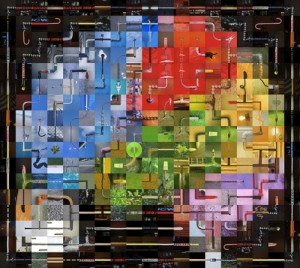
The frontal lobe gets a lot of attention when talking about brain injury. It deserves to, it is important.
Whatever the cause of brain injury, the frontal lobe is also a part of the brain often damaged. This can have a significant impact on a person’s life.
How Important is the Frontal Lobe?
“How come you get so much attention?”
“Who me?” asks the Frontal Lobe explaining “I deserve it, I am terribly important, just ask anybody who has trouble with me!”
“Why are you so special?
“I am the boss. You might call me the ‘Fat Controller‘ (the Fat Controller is so important, he has his own Wiki Page). I manage most of what the brain does. I keep you from doing really silly things and I am responsible for that charming personality you have”.
Now that was my attempt at making anatomy entertaining!
My very own frontal lobe is telling me that this approach may be inappropriate, insensitive, and lacking good judgement. And that is exactly what I would expect a good frontal lobe to do. I am ignoring mine today.
Today I am having a go at a brief, and hopefully simple, explanation of what the frontal lobe does. I am taking this on, as my challenge, because I believe having some idea of anatomy and function helps understanding of the bigger picture of brain injury, what might go wrong AND as a reminder it’s the brain injury talking.
My opening conversation with the frontal lobe was silly…but it is kind of true. When describing executive function in an earlier post : we see the frontal lobe is the boss, the conductor of the orchestra, the place of executive function, the place where cognitive function is often sorted out.
Simply:
It gets to tell the rest of the brain what to do with information that is coming in.
What Is The Frontal Lobe?
Not sure where to find the frontal lobe – it is the largest lobe. It sits at the front of the head, behind your forehead. If you think about the position of the frontal lobe, you can see why it is often bumped in a car accident, or traumatic injury when a person is thrust forward.
Generally, the further forward in the frontal lobe you go, the more high level the function, and the more connections to tell the rest of the brain and body what to do. This is why you often hear or read about the “prefrontal cortex” in brain injury- its the part in the front, of the front, of the frontal lobe!
The Frontal Lobe is also the newest part of the brain (well no, not in the last few weeks, not even in the past 100 years). If you have not yet had a look, you will find a description of this, in a pretty unforgettable and humorous way, in a video clip I shared some time ago where Suzy Polucci mimics that major developmental parts of the brain. I really encourage you to take time to have a look, even just to enjoy her funny presentation. You will be surprised what you learn along the way.
What Does the Frontal Lobe Do?
The frontal lobe collects some information from the body and environment. It also gathers information from all other parts of the brain.It then sorts out what that information means; and organises a response.
As I said in the beginning, it really does monitor and modify our behaviour, our emotions, and judgement, amongst a whole range of other things. Here is a list of just some of the jobs we understand the frontal lobe does:
- Makes us who we are – this sounds a bit grand yet the frontal lobe has a lot of functions, as you will see below, like personality and behaviour, that determine what kind of person we are. There are some who go so far as to say the frontal lobe is what makes us human.
- Social behavior – guiding and sorting out how we should behave with other people, the cultural and community behaviours expected of us.
- Inhibit Behaviour – To ‘inhibit’ or stop inappropriate, or unwanted behaviours and responses.
- Decision making – the frontal lobe collects information from other parts of the brain and within the frontal lobe and guides (hopefully) good and balanced decisions.
- Our personality
- Flexibility of thinking – being able to change thinking or behaviour when new information is presented. Recalling and using information from past experience to decide the best response or action now. Developing strategy and goals for the future.
- Managing Memory, Attention, and Concentration – determining what to pay attention to, what to concentrate on and for how long and what to remember, where and for how long.
- Initiation and Motivation – getting us started, keeping us going, keeping us up to speed.
- Self awareness – monitoring our self – letting us know what is, and what is not OK. What is appropriate, keeping track of and deciding how we interact with our surroundings? Being aware of what we can and cannot do.
- Emotional response – deciding on our emotional responses to various situations and events.
- Judgement and reasoning – sorting and evaluating incoming information to make a decision.
- Expressive language – how you get your message across, how you “express” yourself and your needs. This includes all aspects such as the words used, how you say them, body language, gesture.
- Problem solving, Planning and Organisation – the frontal lobe is like the project manager developing a plan, collecting all the functions needed to carry it, out then making it happen.
- Responding to what’s around us – organising how we react to our environment
Phew – how’s that for an exhausting job description!
Next week I will talk more about what difficulties the frontal lobe can cause, if its upset or damaged. Think about it though – even now you have information that tells you what the frontal lobe does. So you can figure out from that list above, what might happen if it is damaged.
Check the list you come up with against the list next week – you will see you have already gained quite an understanding.
And Finally
My aim is to make information as simple and understandable as I can, so if it seems too simple, I will view that as a job done well.
I am no expert on the brain. I do think it’s a pretty amazing organ and I love learning about it. If you believe I have something wrong, or I have left something out. Please put a comment below.
Also It would be great to add to the resources as well, any easy-to-understand information that will help newcomers understand the frontal lobe – or any other topic.
If you are interested in more detailed anatomy this video is relatively simple but more about the structure and anatomy of the frontal lobe:
[box style=”rounded” border=”full”]The Frontal Lobe – Interactive Biology[/box]
I am not a great reader of factual anatomy and function style books, I did use a book I have had for a number of years to reference this post. The author identifies the chapters that are simple and the chapters designed for people who have or want deeper knowledge which I liked. The Executive Brain – Frontal Lobes and the Civilized Mind.
In searching for an online reference for this book I found Dr Goldberg’s website – I have not explored it yet, but it looks like a great source of more info.


Pingback: Frontal Lobe Damage: When the Leader Can't Lead - Changed Lives, New Journeys
Pingback: WHAT DO KING HENRY VIII BRAIN INJURY AND BEHAVIOUR CHANGE HAVE IN COMMON? - Changed Lives, New Journeys
Pingback: Your Marvellous Brain. Part 2: Through Paparazzi Eyes - Changed Lives, New Journeys
Pingback: Your Marvellous Brain. Part 1: User Manual - Changed Lives, New Journeys
Pingback: Where Angels Fear to Tread: Impulsivity after Brain Injury - Changed Lives New Journeys
Pingback: Our Touchy Feely Parietal Lobes - Changed Lives New Journeys
Pingback: Memory 103 - Memory and the Brain - Changed Lives New Journeys